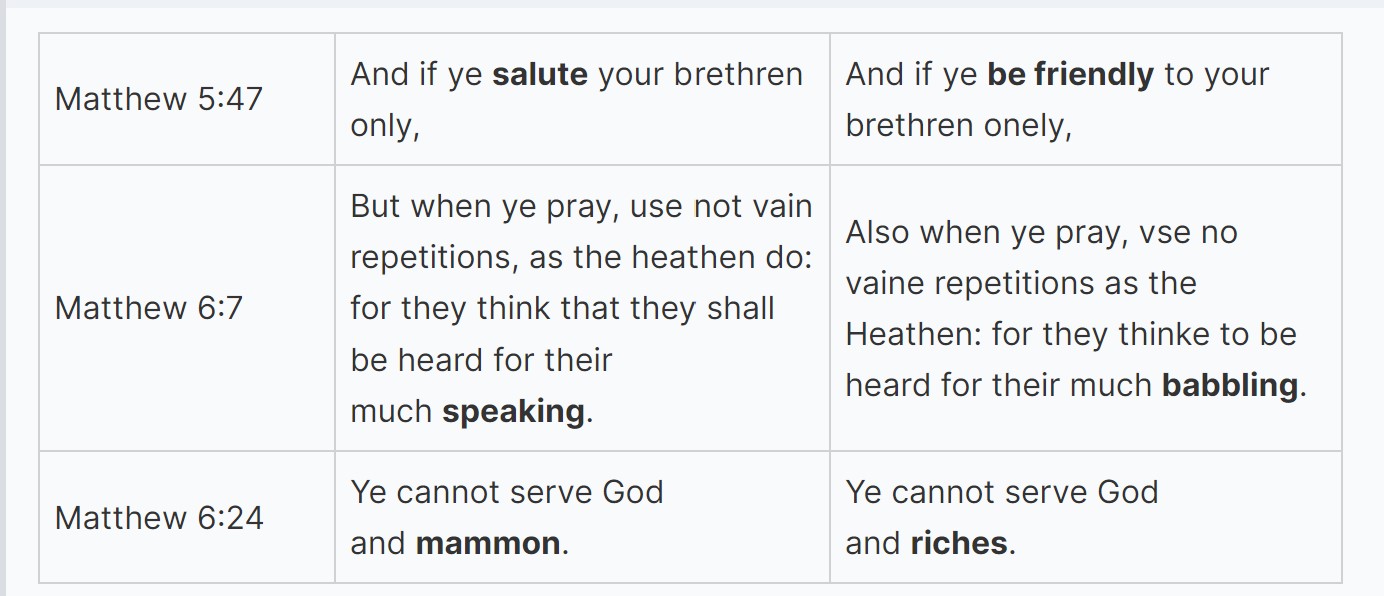Question
Gramps,
What are the differences between the Geneva Bible and the King James version? Which came first? If the Geneva Bible came first why doesn’t The Church of Jesus Christ of Latter-day Saints use that bible? I understand the inspired version of the KJV bible and the need for it, but some people scoff at either version of the KJV bible and say they use the Geneva Bible because it is so much better. Is the Geneva Bible that much better than the KJV? Is the Geneva Bible worth buying and reading?
Scott
Answer
Scott,
Many translations exist because everyone has an opinion on the intended meaning of the original languages. Some translations are merely to update the language to provide a modern reader with an interpretation in more recognizable speech. But with all these attempts, we must realize that most translations to any modern language (even modern Greek) is partially a matter of opinion.
You may think that is a reason to not read other translations. No, quite the contrary. I believe it is beneficial for people to read many different translations to get a feel for what the original language version really intended. And reading differing translations doesn’t necessarily mean that either is wrong. But it may simply be that the translators emphasized one meaning of a phrase over another. It would be quite educational to read multiple translations.
To answer your questions:
What are the differences between the Geneva Bible and the King James version?
The most famous is the use of the word “Tyrant.” The Geneva Bible tended to use the word “tyrant” much more often than the King James Version (KJV). While tyrant is still used to describe Antiochus in 2 Maccabees (part of the Apocrypha) the KJV uses “king” in most other passages.
It is rumored that King James didn’t like the idea of using “Tyrant” in place of “King” in so many places. Still, some other scholars say that the language and context gave no justification for using “Tyrant.”
What further adds fire to the debates is that at the time, Geneva was a republic while most of Europe was ruled by a monarchy. So, to the Genevans, “king” and “tyrant” were synonymous. But King James was known to be less, well, tyrannical than previous kings. So, there may have been some change of heart towards kings because of him. And the sentiment may have motivated a different translation for “kind kings.”
Other changes are largely synonymous but do give different flavors of translation. For example:
And you may also notice some changes in spelling as well. That’s part of reading really old texts. If you thought the KJV was difficult to read, you’ll find the Geneva Bible to be incomprehensible. I’ll share a special example:
We have named our first mother Eve. But that name actually comes from the Hebrew name Chaya (sometimes pronounced:chava). But the ch has a different pronunciation which is the throated phlegm sound found in many languages of the Middle East. So, it is often transliterated as an H in English. The Geneva Bible thus renders her name as Haueh because (as you may have noticed in the examples above) they hadn’t even standardized the separation of the u and the v at the time of the writing.
Which came first the Geneva Bible or the King James Version?
Geneva Bible was published in 1560. The KJV was published in 1611.
If the Geneva Bible came first why doesn’t The Church of Jesus Christ of Latter-day Saints use that bible?
At the time of the restoration, the most commonly read English Bible in the world was the King James Version. It was the version people were familiar with. Joseph Smith was raised reading the King James Bible because that was the most commonly used Bible during his formative years. Even today where we have dozens of versions of the Bible that are all favored by many different sects and individuals, the King James version (also known as The Authorized Version) is still the most popular version in use in the English world.
So, for inclusion as part of the Church’s standard works, the KJV was a clear choice. It was the version that most people had read and memorized verses out of. As a result, when we refer to verses in the Bible, we are all speaking the same language. And to Joseph, who had been raised with it, he felt like there was something sacred about the language of the KJV.
I understand the inspired version of the KJV bible and the need for it, but some people scoff at either version of the KJV bible and say they use the Geneva Bible because it is so much better. Is the Geneva Bible that much better than the KJV? Is the Geneva Bible worth buying and reading?
Well, that is largely a matter of opinion. I, myself, favor the KJV because I tend to agree with the translation (for the most part) and appreciate the language a lot more than that of the Geneva Bible. I believe that one reason the Geneva Bible is popular is that it has a built-in commentary and study aides. So, it is often considered a study Bible.
I prefer just the Bible itself. I’d like to get many differing opinions as to the commentary. That way I’m not just taking one man’s interpretation while being ignorant of any other interpretations. So, if I want commentary, I seek them out separately and try to get as many opinions as possible.
Because the people involved in the Geneva Bible’s publication tended to lean toward the Calvinist theology, you’ll find that the Geneva Bible interpreted/translated words and phrases to support Calvinism (so much as it is possible to do so). That was also another reason for other sects to prefer a different translation.
If you want to use the Geneva Bible, it’s readily available in many versions, both digital and physical, with or without the Apocrypha included. But you’ll find a lot of it unfamiliar due to the archaic spelling and grammar.
So, if you really wish for a linguistic history challenge, by all means, take it on.
Gramps








